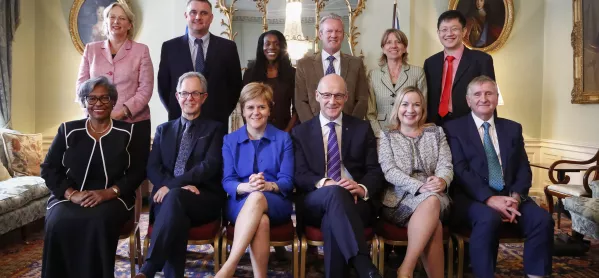- Home
- ‘Pay more attention to pedagogy,’ inspectors told
‘Pay more attention to pedagogy,’ inspectors told

Scotland’s council of international education experts has told the government that school inspectors should spend more time examining how teachers teach.
The 10-strong International Council of Education Advisers (ICEA) have told ministers that, in order to improve teaching, there is “a need for a better understanding of what pedagogy looks like within Scotland’s schools”.
Scotland’s international education advisers, who hail from countries including Finland and the US, have recommended: “As part of its inspection process, Education Scotland needs to look more closely at pedagogy.
“What do inspectors see when they go into schools? What is working, and what are the areas of difficulty? Only once this evidence has been gathered and assessed will it be clear exactly what work needs to be undertaken in order to improve pedagogy.
“It may be helpful to engage more closely with universities to ensure they are providing research that supports policy development in this area.”
The ICEA recommendations are contained in minutes from the body’s September meeting, due to be published today.
The ICEA advisers - who include Andy Hargreaves of the Lynch School of Education at Boston College and Finland’s Pasi Sahlberg - also recommended that teachers were given information about which approaches to teaching work best, and said the government should invest in “staff learning”.
The advisers said: “There also needs to be some reflection, at a national level, on how to quality assure pedagogy so that, no matter what approach individual teachers take, they can be reassured that the pedagogy they are using is informed by good quality research.”
A spokesman for Scottish schools inspectorate Education Scotland responded that learning and teaching is already “a key focus” of inspections. For example, a report out earlier this year - Quality and Improvement in Scottish Education 2012-2016 - highlighted “that the quality of learning and teaching was too variable”.
The spokesman continued: “Education Scotland is committed to ensuring approaches to inspection focus on the quality of learning that all children and young people experience. We will comment on the learning and teaching in every inspection as part of the new suite of improvement approaches.”
In England, Ofsted’s chief inspector Amanda Spielman recently told Tes it would be “self-defeating” never to comment on pedagogy or recommend specific teaching methods, in response to criticism that the inspectorate was veering outside its designated territory.
The ICEA also wants a practising teacher, or headteacher, on every inspection in Scotland so “inspectors have maximum exposure to the current realities of teachers work and lives within schools”. As previously announced by schools inspectorate Education Scotland, an existing teacher or practitioner will, with the exception of very small schools, join every school inspection by April 2018.
The experts supported union demands for more promotion routes for teachers, saying the government should create “a clear leadership strategy with associated investment”, as well as a national champion for the new strategy who has “credibility” and is “an inspirational leader themselves”.
They suggested this should be the new chief executive of Education Scotland; since they met, Gayle Gorman, the former Aberdeen City Council director of education and children’s services, has been appointed to this role.
They also recommend four principles to underpin the six regional improvement collaboratives, including each having a specialisation - like early learning or maths - that they could “lead for the whole country”.
The gathering - the third time the group has met - was held over two days in Glasgow and Edinburgh and included meetings between ICEA and the first minister, Nicola Sturgeon; the deputy first minister and education secretary, John Swinney, as well as professional associations.
Education secretary John Swinney said he had “listened carefully” to the council’s views.
He continued: “In line with their feedback, our education reforms are designed to support and empower teachers and headteachers in a number of ways.
“Crucially, to build capacity and culture in the system, we are strengthening the leadership training on offer and creating new opportunities for career development. For example, by giving schools more money and power to decide for themselves how to close the attainment gap we are already seeing more promoted or specialist posts in schools up and down the country.
“And schools will have access to expertise and support through the Regional Improvement Collaboratives, the leads for which are currently working with Education Scotland to develop plans for delivering subject and sector-specific support.”
ICEA meets twice a year, and the next meeting is scheduled for March.
Keep reading for just £1 per month
You've reached your limit of free articles this month. Subscribe for £1 per month for three months and get:
- Unlimited access to all Tes magazine content
- Exclusive subscriber-only stories
- Award-winning email newsletters



